-
We're Ready to Swim
Posted by Christian Shane on 12/17/2012
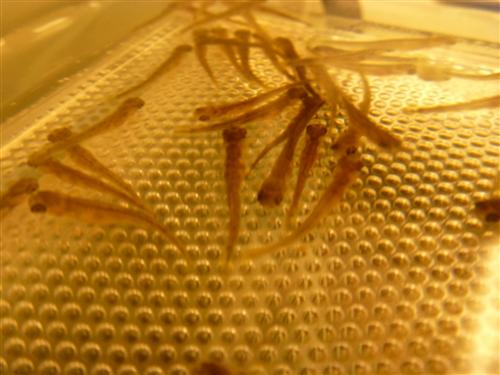 Our alevins are losing their bellies and "buttoning-up." They are looking more like trout each day. Soon we will drop the hatching basket and allow the fry to swim freely in the tank. Then our class will begin feeding them after the break.
Our alevins are losing their bellies and "buttoning-up." They are looking more like trout each day. Soon we will drop the hatching basket and allow the fry to swim freely in the tank. Then our class will begin feeding them after the break. -
The Hatch is Happening
Posted by Christian Shane on 11/16/2012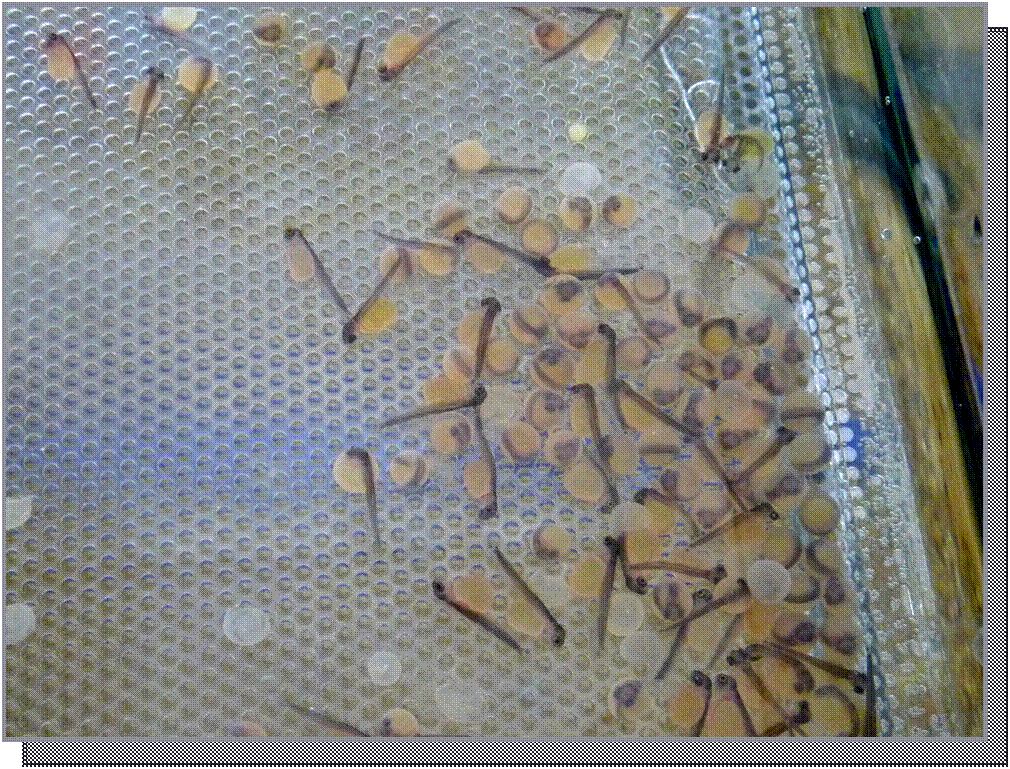
Some of our eggs are hatching into alevins. Egg shells are visible within the hatching basket. They have a large belly of stored food which allows them to grow and survive without food. By the end of the week, all of our eggs will hatch.
-
Our Eggs are Safe!
Posted by Christian Shane on 11/9/2012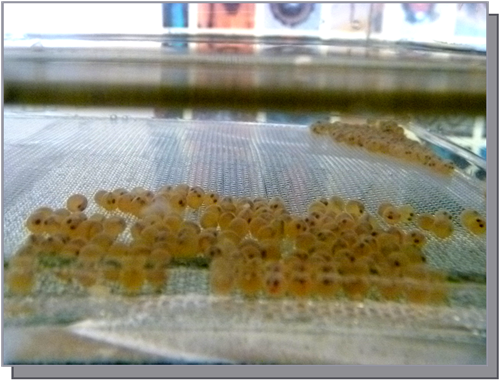
The brook trout “green eggs” are laying in the hatching basket within the tank. They are receiving a good amount of oxygen and need darkness to grow. We keep the tank covered until they hatch into alevins.
-
Separating the Eggs
Posted by Christian Shane on 11/7/2012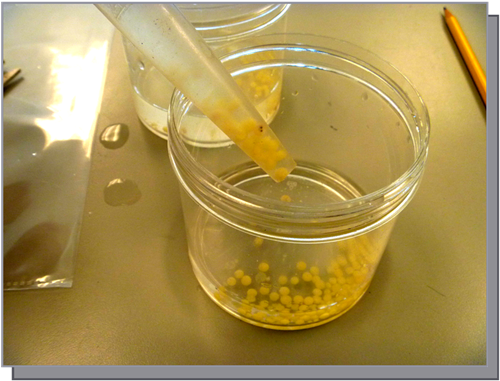
To separate the viable (fertilized eggs) from the non-viable, we used a turkey baster to remove and count them one by one; then we placed them into the tank. We’re starting with 316 viable and 124 non-viable eggs this year.
-
Live Eggs...
Posted by Christian Shane on 11/6/2012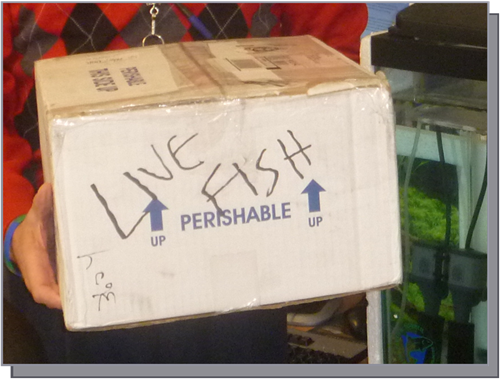
We received our brook trout eggs in the mail from the Benner Springs Hatchery. They came in a Styrofoam container with an ice pack inside, and the eggs sealed in a waterproof plastic bag.
-
Trout Tank is up and running!
Posted by Christian Shane on 10/8/2012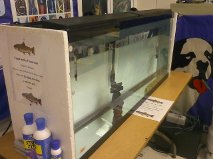
The Trout Tank is up and running with the chiller at a frigid 52 degrees F and the filter and air pump working hard. We await the arrival of our trout eggs from the hatchery in a few weeks.
-
Ten Seconds of Trout
Posted by Christian Shane on 2/21/2012 7:00:00 AMVideo coming soon... -
The Development of Our Trout - Videos by 2A
Posted by Christian Shane on 12/21/2011 8:30:00 AM(These videos take about two minutes to upload, but they are worth seeing!)These are some of our Brook Trout Eyed Eggs. Once eggs have been fertilized they are called green eggs, one of the most fragile life stages for the trout. As they develop, their eyes become visible. We have about 300 eyed eggs in our classroom tank.
In real life, the female Brook Trout selects a location for their nest called a redd. Streams with areas of clean gravel and steady water flow are ideal. Using her tail, a female trout cleans a small area of gravel, while at the same time creating a spot for the eggs. Our redd is in the tank and is called the hatching basket.
Alevins - Click Here for Video(These videos take about two minutes to upload, but they are worth seeing!)These are our Alevins, also known as the Sac Fry. They are newly hatched trout, still attached to and using the yolk sac as food. This sac contains protein, carbohydrates, vitamins and minerals. The yolk sac serves as a mini-lunch bag that feeds the trout until it is completely absorbed. Once the yolk sac is absorbed, called the button-up stage, trout will swim up from the gravel and begin searching for food as a swim-up fry. Alevins begin breathing through their gills when they hatch from the egg. As cold-blooded animals, their body depends on the surrounding environment temperature. As a result, they breathe and grow slower in cold temperatures. Our tank is set for them at 50 degrees Fahrenheit. -
The Eggs are Coming!
Posted by Christian Shane on 11/7/2011 12:00:00 PMHere's a close-up view of our eggs at Benner Springs Hatchery near State College before they were shipped to us. Volunteers worked together to ship them off to the classrooms across Pennsylvania. I helped out with the egg station.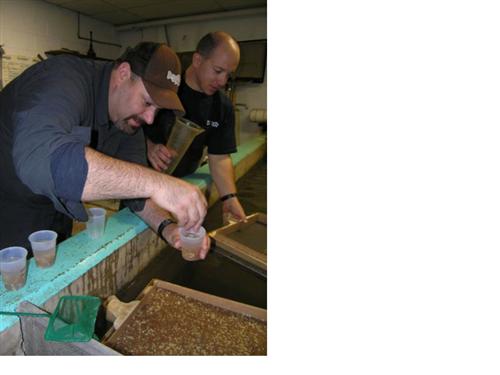
-
The First Trout Blog - Successful Spawning
Posted by Christian Shane on 10/20/2011 8:00:00 AM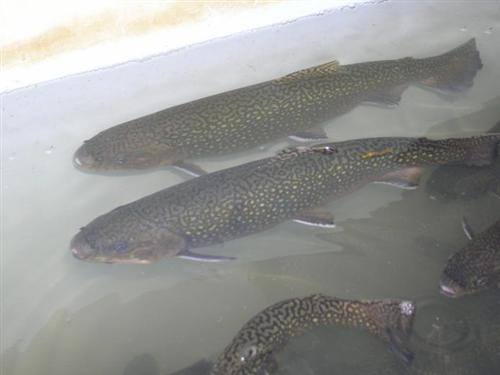 Even though Mr. Shane and the McKnight Elementary Class of 2A haven't received their trout eggs in the classroom just yet, our project has already begun! At the PA Fish & Boat Commission's Benner Spring Hatchery in Bellefonte, PA, these (Above) are our female "Mommy" Brook Trout in the preparation tank before they take the eggs from them. These trout (Below) are the male "Daddy" Brook Trout before they take their milt for the eggs. Notice they are a little brighter in color.
Even though Mr. Shane and the McKnight Elementary Class of 2A haven't received their trout eggs in the classroom just yet, our project has already begun! At the PA Fish & Boat Commission's Benner Spring Hatchery in Bellefonte, PA, these (Above) are our female "Mommy" Brook Trout in the preparation tank before they take the eggs from them. These trout (Below) are the male "Daddy" Brook Trout before they take their milt for the eggs. Notice they are a little brighter in color.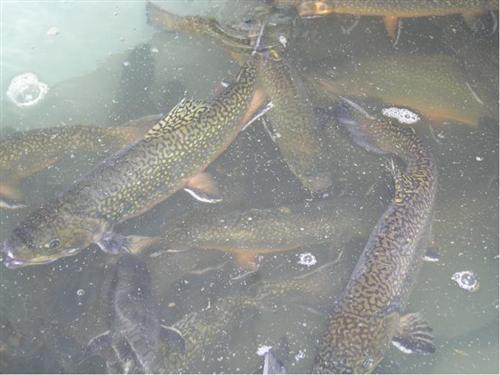 (Below) Next, they take the eggs from the female and mix in the milt from the male brook trout. Then our eggs will sit and fertilize for 30 days until the "eyed egg" stage where they are shipped to us in November!
(Below) Next, they take the eggs from the female and mix in the milt from the male brook trout. Then our eggs will sit and fertilize for 30 days until the "eyed egg" stage where they are shipped to us in November!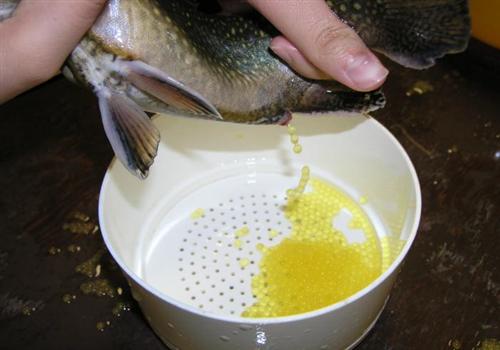 Then at the beginning of November, we will place our Brook Trout eggs into our tank and hatching basket and watch as our brook trout grow.Here's to our fifth year of the Trout in the Classroom project. Stay tuned for details after we receive our eggs!(Thanks to Amidea Daniel for the pictures, Paige Filice, the PA Fish & Boat Benner Spring Hatchery and our Penn's Woods West Chapter of Trout Unlimited for getting us started!)
Then at the beginning of November, we will place our Brook Trout eggs into our tank and hatching basket and watch as our brook trout grow.Here's to our fifth year of the Trout in the Classroom project. Stay tuned for details after we receive our eggs!(Thanks to Amidea Daniel for the pictures, Paige Filice, the PA Fish & Boat Benner Spring Hatchery and our Penn's Woods West Chapter of Trout Unlimited for getting us started!)
Mr. Shane<*))><
Select a School...
Select a School
- Bradford Woods Elementary School
- Franklin Elementary School
- Hosack Elementary School
- Ingomar Elementary School
- Marshall Elementary School
- McKnight Elementary School
- Peebles Elementary School
- Carson Middle School
- Ingomar Middle School
- Marshall Middle School
- NA Intermediate High School
- NA Senior High School
- NA Cyber Academy


